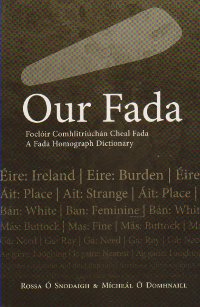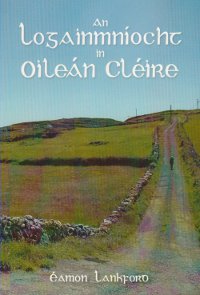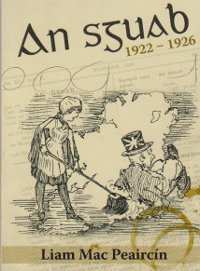Our Fada
Foclóir Comhlitriúchán Cheal Fada
A Fada Homograph Dictionary
Rossa Ó Snodaigh
Mícheál Ó Domhnaill
Coiscéim 2012
ISBN 6660012120307
198 lth.
Cén difríocht atá idir eire agus Éire? Craic agus craic? Léiríonn an foclóir seo mar a athraíonn brí focal má bhíonn fada ar bharr nó fada ar lár: geall le 3,000 focal ar fad. Le léaráidí agus abairtí grinn, tá mórán sa leabhairín saoithiúil seo a chuirfidh gliondar agus ionadh ort – fiú más tú an Ghaeilgeoir is léannta.
What’s the difference between eire and Éire? Craic and craic? This dictionary shows how a fada’s absence or presence changes a word: almost 3,000 words, in fact. With cartoons and comic sentences, this entertaining and illuminating book has many surprises in store – even for the most avid Gaeilgeoir.











Garry Bannister –
In the Name of the Fada
(review of Rossa Ó Snodaigh & MícheálÓ Domhnaill’s ‘Our Fada’)
Garry Bannister
Once again Rossa Ó Snodaigh, author of the ever popular Cliúsaíocht i nGaeilge, has produced another lexicographical gem, this time in cooperation with Micheál Ó Domhnaill. The theme of this extremely entertaining and informative reference book is the elusive ‘fada’ or as the title of the book more affectionately calls it ‘Our Fada’. A title I am told that was suggested by the one and only Des Bishop. The dictionary consists of some 3,000 entries where the appearance or the repositioning of a fada changes the whole means of the word or sentence. It reminds the reader of the unfortunate ambassador to China who instead of thanking his Chinese host, ended up insulting him because of simply using the incorrect intonation. The fada is such a small speck placed over the printed vowel that it is very easy for any proof-reader to miss its omission or inclusion in a word. But small oversights of this kind can profoundly change the meaning of a sentence, often as the authors point out producing an amusing or a shocking alternative. For example, Géibheann Albánach ait (The imprisonment of Albanians is odd) but Geibheann Albanach áit (The Scotsman gets a place) or féar atá rácáilte (grass that is raked) compared with: fear ata racáilte (bloated tortured man).
It’s the kind of book you can take with you on a long bus-ride or leave on you dining-room table or even leave it in the smallest room of the house because it is a book you will never grow tired of dipping into and browsing through. It would also make an excellent book for teachers where students could be asked to create alternative sentences of their own. There are many fascinating common everyday words which can be changed with the slightest stroke of the pen, words such as: cócaire cook/ cocaire cheeky person; cúrsa course/ cursa wheeze; Éire Ireland/ Eire burden; fál hedge/ fal grudge; gráin hatred/ gráín cuddle; Hóra! Hi!/ Hora (duit)! Bad cess (to you)!; inné yesterday/ inne gut, etc.. And then there are words with all kinds of variations of fada-use, such as a word we all now well lachan (_ lacha duck) but lachán means a ‘reed’, láchan ‘the dawning of the day’ and with two fadas: láchán ‘a follishly aimiable person’. The book is virtual treasure-trove of miscellaneous curiosities which will entertain an bewilder even the most agèd and jaded Gaeilgeoir like myself.
In the preface to the dictionary, Rossa explains one of the initial reasons why he became keen to undertake this project in first place. Although admitting that he himself has never been flawless in his own spelling, the incorrect spelling of his band from ‘Kíla’ to ‘Kila’ which would have the association for Irish speakers with the word ‘Cille’ meaning ‘of the graveyard’ and the traditional use of an apostrophe for the fada in his surname Ó Snodaigh (O’ Snodaigh) made him a tad pernickety about spelling and I suppose like all men as he gets older he’s getting more grumpy. But unlike most grumpy old men, Rossa did something positive about it to educate us and to make us all laugh at the same time.
The book is smartly illustrated by a young Czech artist, Frantisek Valouche, with clever humorous examples of word-combinations and phrases altered by the removal or addition of “this most crucial diacritical mark” as Rossa’s co-author Mícheál Ó Domhnaill describes it.
This is a super dictionary, another classic in the immense library of lexicographical excellence that Irish men and women have produced over the years. Hopefully this dictionary is the beginning of a long and productive career of one of Ireland’s newest rising stars who may yet one day join the galaxy of supernova Irish lexicographers – men such as Patrick Dinneen, Liam S Gogan, Tomás de Bhalraithe, Terry Dolan and so many others of their hue.